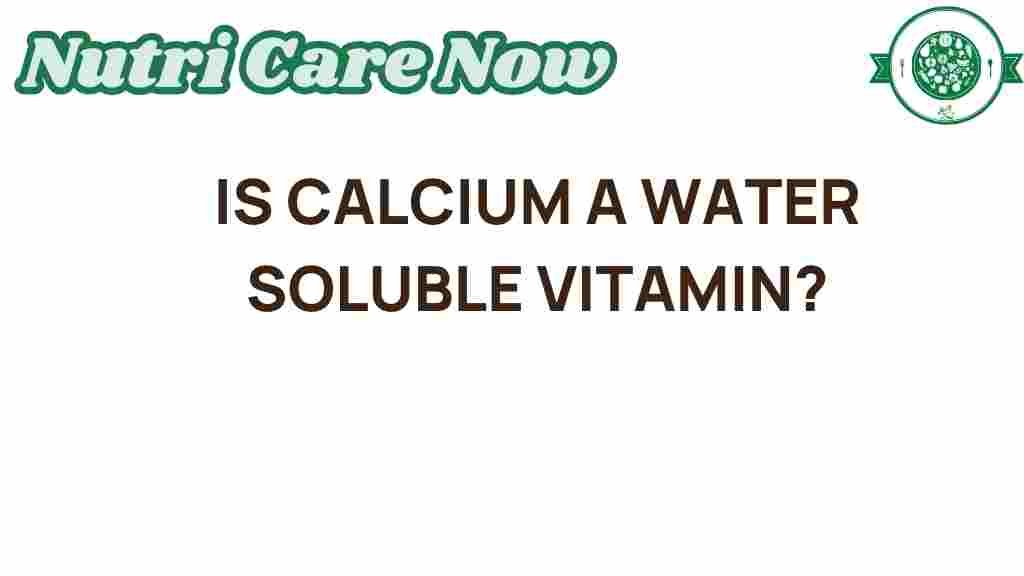Is Calcium a Water-Soluble Vitamin?
Calcium is often confused with vitamins, leading to a flurry of misconceptions about its role in nutrition. In the realm of essential nutrients, calcium stands out for its significant health benefits, particularly in bone health. However, some people wonder if calcium is a water-soluble vitamin. In this article, we will unravel common myths surrounding calcium, explore its properties, and provide dietary advice to ensure you meet your nutritional needs.
Understanding Calcium
Calcium is a mineral, not a vitamin. It plays a crucial role in various bodily functions, including:
- Building and maintaining strong bones and teeth
- Supporting muscle function
- Regulating heart rhythms
- Facilitating nerve transmission
It is important to note that while calcium is essential for health, it is categorized as a macromineral due to its significant presence in the body, rather than as a vitamin.
What Are Water-Soluble Vitamins?
Water-soluble vitamins are nutrients that dissolve in water and are easily absorbed by the body. These include:
- Vitamin C
- Vitamin B-complex (such as B1, B2, B3, B5, B6, B7, B9, and B12)
Unlike calcium, water-soluble vitamins are not stored in large amounts in the body and need to be consumed regularly through diet or supplements. They are crucial for various metabolic processes and overall wellness.
Common Myths About Calcium
Calcium is often surrounded by misconceptions. Here, we debunk some common myths:
- Myth 1: Calcium is a vitamin.
- Myth 2: All calcium sources are equally beneficial.
- Myth 3: You can only get enough calcium from dairy products.
- Myth 4: More calcium means stronger bones.
Understanding these myths is vital for making informed dietary choices and ensuring optimal health.
The Importance of Calcium in Nutrition
Calcium is an essential nutrient for everyone, from children to the elderly. Here’s why it’s important:
- Bone Health: Calcium is critical for developing and maintaining bone density.
- Prevention of Osteoporosis: Adequate calcium intake can help reduce the risk of osteoporosis, especially in older adults.
- Muscle Function: Calcium plays a key role in muscle contraction and relaxation.
Incorporating calcium-rich foods into your diet is essential for overall health and wellness.
How to Get Enough Calcium
To ensure you’re getting enough calcium, consider the following dietary advice:
- Dairy Products: Milk, cheese, and yogurt are excellent sources of calcium.
- Leafy Greens: Vegetables like kale, broccoli, and spinach provide calcium, though in smaller amounts.
- Fortified Foods: Many products, such as plant-based milk and cereals, are fortified with calcium.
- Nuts and Seeds: Almonds and sesame seeds are great sources of this essential mineral.
It’s important to maintain a balanced diet that includes these foods to meet your calcium needs.
Calcium Supplements: When to Consider Them
While getting calcium from food is ideal, some individuals may require supplements. Consider the following:
- Age: Older adults may need additional calcium to prevent bone loss.
- Dietary Restrictions: Vegans or those with lactose intolerance may struggle to get enough calcium from food alone.
- Medical Conditions: Certain health conditions may increase the need for calcium.
If you are considering calcium supplements, it’s essential to consult with a healthcare professional to determine the right dosage and type for your needs.
Potential Risks of Calcium Overload
While calcium is necessary for health, excessive intake can lead to health issues, such as:
- Kidney Stones: High calcium levels can contribute to the formation of kidney stones.
- Hypercalcemia: Excessive calcium in the blood can lead to nausea, vomiting, and other serious symptoms.
- Cardiovascular Issues: Some studies suggest a potential link between high calcium supplements and heart problems.
It is crucial to find a balance and ensure you are not overconsuming calcium, especially through supplements.
Calcium and Other Nutrients
Calcium works in tandem with other essential nutrients, particularly:
- Vitamin D: Enhances calcium absorption in the body.
- Magnesium: Supports bone structure and health.
- Vitamin K: Plays a role in calcium metabolism and bone health.
A well-rounded diet that includes these nutrients will help maximize the benefits of calcium and support overall health.
Step-by-Step Guide to Ensuring Adequate Calcium Intake
To effectively manage your calcium intake, follow these steps:
- Assess Your Current Intake: Track your dietary calcium for a week to see if you meet the recommended daily allowance (RDA).
- Incorporate Calcium-Rich Foods: Add a variety of calcium sources to your meals.
- Consider Fortified Products: Look for foods that have added calcium, especially if you’re on a restricted diet.
- Consult a Healthcare Professional: If you’re unsure about your calcium needs or considering supplements, speak with a healthcare provider.
- Monitor Your Health: Keep an eye on any potential symptoms of calcium deficiency or overload.
Troubleshooting Calcium Intake Issues
If you find it challenging to meet your calcium needs, consider the following tips:
- Try Different Sources: Experiment with various foods or try calcium-fortified options.
- Cook with Calcium-Rich Ingredients: Incorporate ingredients like almonds and leafy greens in your recipes.
- Use Supplements Wisely: If necessary, choose a supplement that suits your dietary needs and consult with a professional.
- Stay Informed: Read labels and nutrition information to make better choices.
Conclusion
In conclusion, calcium is not a water-soluble vitamin but an essential mineral that plays a vital role in maintaining health and wellness. Understanding the myths surrounding calcium and its importance in nutrition is key to making informed dietary choices. By ensuring adequate calcium intake through diet and, if necessary, supplements, you can support your bone health and overall wellbeing.
For more information on vitamins and essential nutrients, check out this resource. Remember, always prioritize a balanced diet to achieve optimal health.
This article is in the category Health and created by NutriCareNow Team

1 thought on “Is Calcium a Water-Soluble Vitamin? Unraveling Common Myths”